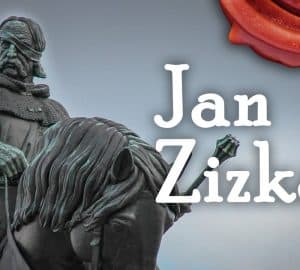Update: The mystery of the true author of the prayer has been solved! It was written by Rev Addison Groff in 1945. You can find more information in our update post here.

There is an interesting prayer that appears in books and websites and is attributed to Sir Francis Drake, an English 16th century explorer and soldier. It goes like this:
Disturb us, Lord, when
We are too well pleased with ourselves,
When our dreams have come true
Because we have dreamed too little,
When we arrived safely
Because we sailed too close to the shore.Disturb us, Lord, when
With the abundance of things we possess
We have lost our thirst
For the waters of life;
Having fallen in love with life,
We have ceased to dream of eternity
And in our efforts to build a new earth,
We have allowed our vision
Of the new Heaven to dim.Disturb us, Lord, to dare more boldly,
To venture on wider seas
Where storms will show your mastery;
Where losing sight of land,
We shall find the stars.
We ask You to push back
The horizons of our hopes;
And to push into the future
In strength, courage, hope, and love.
Finding a source for this is far from easy. It is easy to find it quoted in many books, but only in books of inspirational prayers and quotes, not real history. These books rarely have footnotes, and finding the source of this quotation proved difficult. There is an article called Drake’s Prayer by D. Bonner-Smith from 1950 that examines the history of a prayer from Drake, but it runs much differently:
O Lord God, when though givest to thy servants to endeavour any great matter, grant us also to know that it is not the beginning, but the continuing of the same unto the end, until it be thoroughly finished, which yieldeth the true glory; through him who for the finishing of they work laid down his life, our Redeemer, Jesus Christ.1
This came from the 1941 book Daily Prayer, which modernized quotes of historical figures “who did not deliberately write prayers as such, but wrote something closely akin to prayer….”

This quote originated in an article in the London Times of November 20th, 1939:
There must be a beginning of every matter, but the continuing unto the end yields the true glory. If we can thoroughly believe that this which we do is in defence of our religion and country, no doubt our merciful God for his Christ our Saviour’s sake is able and will give us victory, though our sins be red.
Published at the beginning of World War II, it served as a inspiration to a nation embarking on war.

This quote was not without basis. It seems to have come from a letter written by Drake to Sir Francis Walsingham, Secretary of State, on May 17, 1587. He said:
There must be a begynnyng of any great matter, but the contenewing unto the end untyll it be thoroughly ffynyshed yeldes the trew glory. Yf Hanybull hda ffollowed his victoryes, it is thowght of many he had never byne take by Sepyo.
God mak us all thanckfull agayne and agayne that we have, althowghe it be lettell, mad a begennyng upon the cost of Spayne. If we can thorowghly beleve that this which we dow is in the defence of our relygyon and contrye, no doubt but out mercyfull God for his Christ, our Savyour’s sake, is abell, and will geve us victory, althowghe our sennes be reed. God geve us grace that we may feare hym, and daylly to call upon hym, so shall nether Sattan, nor his menesters prevayell agaynst us; although God permett yow to be towched in body, yeat the Lord will hold his mynd pure.2
The author in the Times took this quotation, modernized the language, and removed the references to Hannibal and the Spanish Coast.
But even this does not find us a source for the prayer given at the beginning of this post. We could find no reference to it in historical works. The first work we could find that referenced it was Cathedral Age published by the Protestant Episcopal Cathedral Foundation in 1985, but there we can not be sure it is even attributed to Francis Drake as we don’t have a copy of the book. The date 1577 is referenced at times, perhaps this is a corruption of the 1587 date for the other rewritten prayer.
Do you have any thoughts or more information about either of these prayers? Please contact us and let us know.
1. Drake’s Prayer by D. Bonner-Smith in The Mariner’s Mirror, volume 36, issue 1, 1950, p. 86-87.
2. The Life, Voyages, and Exploits of Adirmal Sir Francis Drake, Knt by John Barrow (London: John Murray Albemarle Street, 1843) p. 233-234.





The prayer “Disturb us, Lord” appears in The Minister’s Manual Vol 37 (not sure which month’s issue) from 1967 and is attributed to M K W Heicher.
Most experts regard the language as evidently not Elizabethan and therefore the Drake attribution spurious.
Thanks for the information, Stephen! The language definitely does not seem period appropriate.
Does this mean vol. 42 for 1967 or vol. 37 for 1962? I don’t have access to the books themselves, but it is clear from a browse in ABE that one of the figures is five years out. Also I note that Heicher was the editor of the volume. Is authorship by him a default attribution (by you or some other) or does the editor specify that he composed this prayer himself?
Since you seem to be interested in the curiosity of this prayer’s misattribution, I’ll share that I fell down this rabbit hole too and it seems as though the actual author is the Rev. Addison H.
Groff, who wrote it in 1945. Heicher cites Groff as the source of the prayer in the 1962 version of the Manual. If you’re interested, there’s some sources below:
https://callidkeefeperry.com/the-image-of-fish/2024/1/28/disturb-us-o-lord-the-misattributions-and-authorship-of-a-prayer
Thanks for the link to your post!
The prayer is good enough to stand by itself. Attaching to it the name of Sir Francis Drake immediately makes it suspect, which is a shame. Drake was a heroic figure but never set out to be a model of thoughtful, prayerful, God-centred life. The charitable view, I suppose, must be that persons ignorant of history allow themselves to be misled. But what of the originator of this falsehood?
At the end, … we are inspired by the insight and revelation that the author of this prayer had… by his spiritual bravery and self-evaluation… By the closeness of the author, the true author, of this prayer to God’s calling… So, the question of authenticity is … meaningless to me, it is all meaningful for it’s essence, not attribution to a person, or a historical figure…
Was looking for some takes regarding this topic and I found your article quite informative. It has given me a fresh perspective on the topic tackled. Thanks!
I’ve also seen it attributed to Nelson Mandela..!
Casting attribution back and forward.
Thank you for this thread.
My prep school headmaster frequently used the Bonner-Smith prayer back in the 1960s. Momchil is right, the prayer is inspirational, whether or not truly by Drake, whether or not he was a spiritual person. Thank you for this thread.